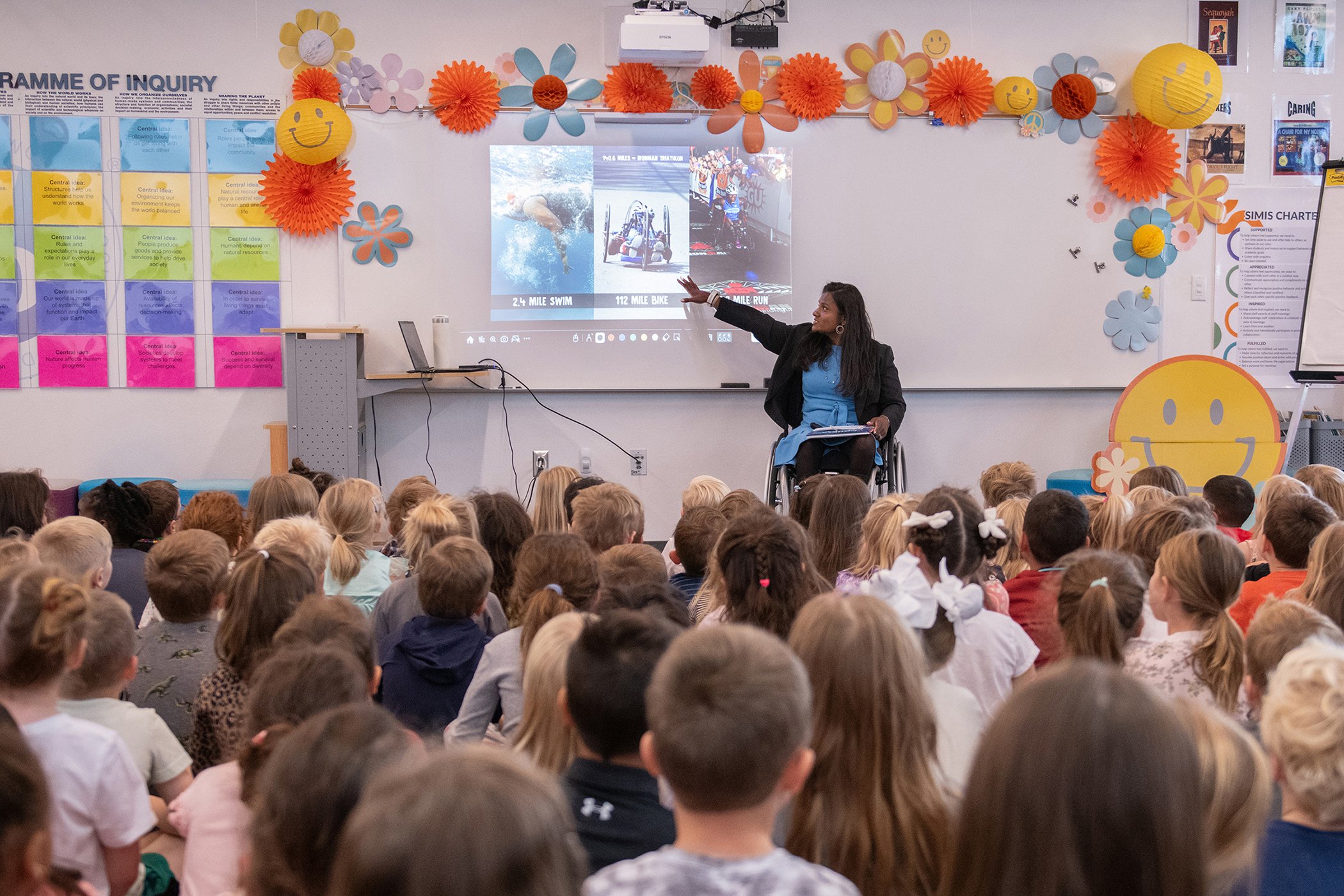Growing up, Minda Dentler was a proud spectator cheering on her three siblings as they competed in cross country, tennis, wrestling, and football. “They were athletic. I was on the sidelines,” she says.
Dentler, who contracted polio as a baby, first used leg braces and crutches and later, as an adult, a wheelchair. She never saw people with disabilities participating in sports and didn’t realize it was an option for her.
After college, Dentler moved to New York City, where, at age 28, she joined an athletic club for people with disabilities. Through this group, she went on her first bike ride in Central Park. “It was exhilarating,” she says. “I went fast, and I felt the wind in my hair, and I was hooked. That experience opened up a whole new world, and I fell into sports hard.”
 Minda Dentler gives a presentation on her book, "The Girl Who Figured it Out" to a class of students at Madison Simis Elementary School in Phoenix, Arizona, on Oct. 18, 2024. At age 28, Minda joined an athletic club for people with disabilities.
Minda Dentler gives a presentation on her book, "The Girl Who Figured it Out" to a class of students at Madison Simis Elementary School in Phoenix, Arizona, on Oct. 18, 2024. At age 28, Minda joined an athletic club for people with disabilities.
Dentler, a full-time finance professional, would wake up at the crack of dawn to train. She learned how to swim and run using a racing wheelchair, and although the early mornings were tough, they were filled with joy as she pushed herself to the limits. At 30, she started competing in triathlons.
Dentler had her sights set on a major goal: completing the Ironman World Championship, an annual triathlon in Hawaii that includes a 2.4-mile open-water swim, a 112-mile bike ride across the Hawaiian desert, and a 26-mile marathon. In 2013, with her family and friends cheering her on, Dentler became the first female wheelchair athlete to complete the Ironman.
Now an inspirational speaker and advocate, Dentler has taken to stages including TED and Global Citizen Festival to share her story of being a polio survivor while also highlighting the importance of global health advocacy. Minda Dentler holds copies of her book during a presentation to students at Madison Simis Elementary School in Phoenix, Arizona, on Oct. 18, 2024.
Minda Dentler holds copies of her book during a presentation to students at Madison Simis Elementary School in Phoenix, Arizona, on Oct. 18, 2024.
Polio, a highly infectious viral disease, can invade a person’s nervous system, causing paralysis and, in some cases, death. Dentler’s passion for health initiatives took her to India in 2015, where she participated in a vaccine drive for World Immunization Day. Alongside health workers and volunteers, Dentler helped vaccinate babies against polio.
The polio vaccine, administered orally (OPV) or through a shot (IPV), can provide lifelong protection for children. Dentler, born in a village near Mumbai, India, contracted polio at around six months old because the vaccine was not available to her.
“It felt like a full circle moment,” she reflects. “When I was born, my mother wasn’t able to protect me from polio, and my legs were paralyzed because of it, and here I am, back in India, helping protect these mothers’ babies from polio.”
Since 1988, cases of polio due to wild poliovirus have decreased by over 99%. There is no cure for the virus, which mainly affects children under 5 years of age, but it is preventable through vaccines. As long as a single child remains infected by polio, children globally are at risk of contracting the disease as the virus spreads person-to-person through a fecal-oral route or through a source such as contaminated water. “Vaccines don’t just protect individuals, they safeguard entire communities,” Dentler says.
Adopted by a family in the US at age three, Dentler’s parents instilled in her the belief that she could do anything. That attitude was crucial as she taught herself to walk, climb stairs, and perform other tasks that seemed to come easier to her non-disabled peers.
“Many times, I felt different because I couldn’t participate in all the activities like the other kids,” Dentler says. “Kids would stare at me and make comments about my leg braces, and adults would talk over me.”
Although she often felt out of place growing up, Dentler says she had a “quiet determination” that drove her to invest all her energy into the things she loved. She immersed herself in her studies and undertook new pursuits that piqued her interest, like playing the piano. That innate characteristic continued through adulthood as Dentler pursued graduate studies, began consulting and started a family.
“I never let my disability stop me from achieving my goals,” she asserts.
 Author and athlete Minda Dentler, poses for a portrait on Oct. 18, 2024, in Phoenix, Arizona.
Author and athlete Minda Dentler, poses for a portrait on Oct. 18, 2024, in Phoenix, Arizona.
It’s that same message Dentler has strived to share with others. Recalling that she didn’t read any books featuring characters with disabilities while growing up, Dentler decided to write her own. The Girl Who Figured It Out shares her journey from being an orphan with polio to becoming an Ironman athlete.
“Challenges don’t define us,” Dentler says. “I hope my story empowers … [people to] face their life with courage and self-belief.”
Disclosure: The World's Best Shot is a profile series dedicated to sharing the stories of vaccine activists around the world. This series was made possible with funding from the Bill and Melinda Gates Foundation. Each piece was produced with full editorial independence.